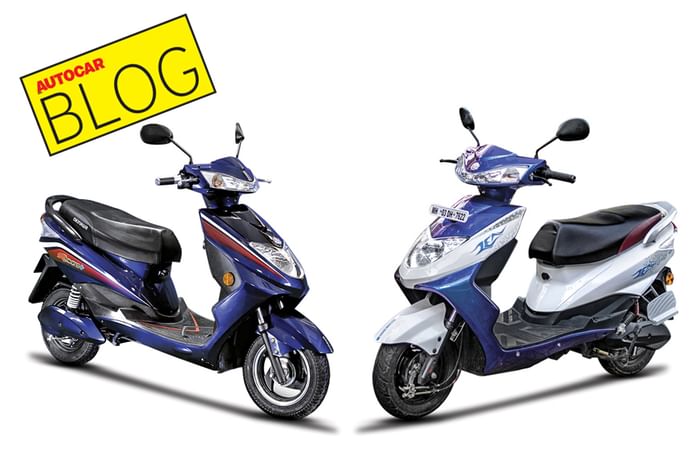The EV invasion
Low-cost Chinese EVs are being sold as Indian products.
Published on Feb 21, 2020 09:00:00 AM
19,085 Views
Follow us on
Okinawa Ridge Plus on the left, Ampere Zeal on the right - spot the differences!
Two years ago, we broke the story that Okinawa Electric’s scooters were apparently rebadged and localised versions of scooters made by a Chinese firm called Luyuan, whose products can be bought in bulk on e-commerce websites. Okinawa was the first well-known brand that we became aware of carrying out this practise, while claiming that their products were in-house developments. But over the past couple of years, it’s become apparent that an increasing percentage of EV two-wheelers sold in India are coming through this route and the latest example is the most blatantly obvious – the new Ampere Zeal that’s almost completely identical to the Okinawa Ridge Plus!
This trend finds its roots in the unorganised three-wheeler EV space, but it’s quickly spreading to two-wheelers. New and unheard of EV brands are emerging from the woodwork so quickly that I’ve had to create a spreadsheet to keep track of all the names. So far, there are 23 names on my list, and of those, I can only identify seven as Indian start-ups who seem to be genuinely designing and developing in-house.
I find it strange that this is being allowed to happen in an industry that has been so fiercely against foreign products. Remember the ban on direct imports of sub-800cc motorcycles, the extreme difficulty in importing used motorcycles and the brutally high import duty rates on large-capacity machines? When governments have so vehemently protected the industry from outside players that were selling far more expensive machinery, why are they now sitting idly by and letting a flood of cheap and mostly sub-par EVs into our market? As a good friend in the industry puts it – someone somewhere is probably making a lot of money.
Don’t get me wrong, I have nothing against the sale of China-made products. It’s impossible to avoid them in the modern world, and in many cases, the best of technology now emerges from the Chinese empire. But what’s troubling is that so many businesses have found a way to sell these vehicles under the guise of being Indian products.
At the moment, all these brands have to do have to do is localise a certain percentage of parts to meet the FAME II subsidy and sell their products to unwitting customers. The government needs to tighten up the policies that allows a firm to call its offering an ‘Indian product’. More urgently though, we need the few genuinely Indian manufacturers like Ather, Bajaj, Ultraviolette, and the much overdue Tork to step up and get their products out in the wider market, because it doesn’t matter how good your EV is if almost no one can buy it. Until then, my advice to you as a customer is to stay vigilant, ask questions and try to understand the origins of that temptingly priced EV before you buy it.
UPDATE
This blog first appeared in the December 2019 edition of Autocar India. Since then a few things have happened. First, TVS came out with the iQube, adding to the list of EV products that have been genuinely designed and developed in India. And then the Auto Expo happened.
The 2020 Auto Expo was a very dull affair in terms of two wheelers with just two mainstream manufacturers. However, there were a whole host of two-wheeler businesses with EV products on display. The most well-known was Hero Electric, which had a new motorcycle, a trike and a whole bunch of scooters. The thing to note with Hero Electric is that it has nothing to do with Hero MotoCorp and the company is open about the fact that it doesn't design/develop its own products. These are in fact sourced from numerous 'international vendors'. And sure enough, all Hero Electric's products seemed to origin from a certain Eastern region of the planet.
While Hero Electric is open about where its products come from, companies like Okinawa certainly aren't. Okinawa had a new electric maxi scooter, which as usual they claim is developed by themselves, and as usual, a nearly identical version can be found on the Luyuan.
Other brands had multiple two wheelers that can also be found on Chinese bulk order websites. A couple of especially blatant examples were that the Eeve stall housed an identical scooter to one that could be found in the Hero Electric stall. Another company named Kabira Mobility had two electric motorcycles that were blatant rip-offs of the Kawasaki Ninja 300 and Ninja 400, and surprise, surprise - both motorcycles can be found in the murky depths of the Chinese interwebs.
I'll conclude this just as I concluded the original blog. Apparently there is nothing wrong with what these companies are pulling off, otherwise the government would have certainly stepped in, no? As a consumer, then, all you can do is stay vigilant and be fully aware of what you are buying.



Comments
Member Login
Personal Details
No comments yet. Be the first to comment.